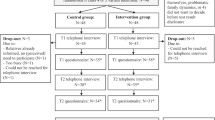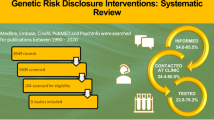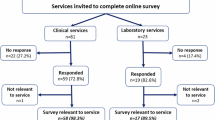Abstract
When an inherited genetic condition is diagnosed in an individual it has implications for other family members. Privacy legislation and ethical considerations can restrict health professionals from communicating directly with other family members, and so it is frequently the responsibility of the first person in a family to receive the diagnosis (the proband) to share this news. Communication of genetic information is challenging and many at-risk family members remain unaware of important information that may be relevant to their or their children’s health. We conducted a randomised controlled trial in six public hospitals to assess whether a specifically designed telephone counselling intervention improved family communication about a new genetic diagnosis. Ninety-five probands/parents of probands were recruited from genetics clinics and randomised to the intervention or control group. The primary outcome measure was the difference between the proportion of at-risk relatives who contacted genetics services for information and/or genetic testing. Audit of the family genetic file after 18 months revealed that 25.6% of intervention group relatives compared with 20.9% of control group relatives made contact with genetic services (adjusted odds ratio (OR) 1.30, 95% confidence interval 0.70–2.42, P=0.40). Although no major difference was detected overall between the intervention and control groups, there was more contact in the intervention group where the genetic condition conferred a high risk to offspring (adjusted OR 24.0, 95% confidence interval 3.4–168.5, P=0.001). The increasing sophistication and scope of genetic testing makes it imperative for health professionals to consider additional ways of supporting families in communicating genetic information.
Similar content being viewed by others
Log in or create a free account to read this content
Gain free access to this article, as well as selected content from this journal and more on nature.com
or
References
Wilson BJ, Forrest K, van Teijlingen ER et al: Family communication about genetic risk: the little that is known. Commun Genet 2004; 7: 15–24.
Gaff CL, Clarke AJ, Atkinson P et al: Process and outcome in communication of genetic information within families: a systematic review. Eur J Hum Genet 2007; 15: 999–1011.
Landsbergen K, Verhaak C, Kraaimaat F, Hoogerbrugge N : Genetic uptake in BRCA-mutation families is related to emotional and behavioral communication characteristics of index patients. Fam Cancer 2005; 4: 115–119.
Clayton EW : What should the law say about disclosure of genetic information to relatives? J Health Care Law Policy 1998; 1: 373–390.
Claes E, Evers-Kiebooms G, Boogaerts A, Decruyenaere M, Denayer L, Legius E : Communication with close and distant relatives in the context of genetic testing for hereditary breast and ovarian cancer in cancer patients. Am J Med Genet A 2003; 116A: 11–19.
Kerzin-Storrar L, Wright C, Williamson PR et al: Comparison of genetic services with and without genetic registers: access and attitudes to genetic counselling services among relatives of genetic clinic patients. J Med Genet 2002; 39: e85.
McConkie-Rosell A, Finucane B, Cronister A, Abrams L, Bennett R, Pettersen B : Genetic counseling for fragile X syndrome: updated recommendations of the National Society of Genetic Counselors. J. Genet Couns 2005; 14: 249–270.
Gaff C, Collins V, Symes T, Halliday J : Facilitating family communication about predictive genetic testing: probands’ perceptions. J Genet Couns 2005; 14: 133–140.
Forrest LE, Delatycki MB, Skene L, Aitken M : Communicating genetic information in families - a review of guidelines and position papers. Eur J Hum Genet 2007; 15: 612–618.
Suthers GK, Armstrong J, McCormack J, Trott D : Letting the family know: balancing ethics and effectiveness when notifying relatives about genetic testing for a familial disorder. J Med Genet 2006; 43: 665–670.
Forrest LE, Burke J, Bacic S, Amor DJ : Increased genetic counseling support improves communication of genetic information in families. Genet Med 2008; 10: 167–172.
Hodgson JM, Metcalfe SA, Aitken M et al: Improving family communication after a new genetic diagnosis: a randomised controlled trial of a genetic counselling intervention. BMC Med Genet 2014; 15: 33.
Hodgson J, Gaff C : Enhancing family communication about genetics: ethical and professional dilemmas. J. Genet Couns 2013 Feb; 22: 16–21.
Medical Research Council. A framework for development and evaluation of RCTs for complex interventions to improve health, 2000, p.2.
Hawe P, Shiell A, Riley T : Complex interventions: how "out of control" can a randomised controlled trial be? Br Med J 2004; 328: 1561–1563.
Craig P, Dieppe P, Macintyre S et al: Developing and evaluating complex interventions: the new Medical Research Council guidance. Br Med J 2008; 337: 979–983.
Gaff C, Hodgson J : A genetic counseling intervention to facilitate family communication about inherited conditions. J. Genet Couns 2014; 23: 814–823.
National Health and Medical Research Council (NHMRC) Use and disclosure of genetic information to a patient's genetic relatives under Section 95AA of the Privacy Act 1988 (Cth) 2014, https://www.nhmrc.gov.au/guidelines-publications/pr3.
Gaff C, Galvin K, Bylund C : Facilitating family communication about genetics in practice; in Gaff C, Bylund C (eds): Family Communication about Genetics: Theory and Practice. New York: Oxford University Press, 2010.
Green RC, Berg JS, Grody WW et al: ACMG recommendations for reporting of incidental findings in clinical exome and genome sequencing. Genet Med 2013; 15: 565–574.
van El CG, Cornel MC, Borry P et al: Whole-genome sequencing in health care: recommendations of the European Society of Human Genetics. Eur J Hum Genet 2013; 21: 580–584.
Sanson-Fisher RW, Bonevski B, Green LW, D'Este C : Limitations of the randomized controlled trial in evaluating population-based health interventions. Am J Prev Med 2007; 33: 155–161.
Datta J, Petticrew M : Challenges to evaluating complex interventions: a content analysis of published papers. BMC Public Health 2013; 13: 568.
Wiens M, Wilson B, Honeywell C, Etchegary H : A family genetic risk communication framework: guiding tool development in genetics health services. J Commun Genet 2013; 4: 233–242.
Acknowledgements
We are grateful to all of the research participants and the genetic counsellors for their role in this project. We thank Hannah Brown, Veronica Collins, Denise Goodwin, Phuong Nguyen, Jean Paul and Loren Plunkett for their roles within the project team. This study was funded by grant from the National Health and Medical Research Council (NHMRC), Project No 491214. This research was supported by the Victorian Government’s Operational Infrastructure Support Program.
Disclaimer
The manuscript contains original material which is not under review elsewhere. The study received appropriate ethical review at all of the research sites.
Author information
Authors and Affiliations
Corresponding author
Ethics declarations
Competing interests
The authors declare no conflict of interest.
Additional information
Author contributions
All authors have made a substantial contribution to the conception and design of the study and participated in regular steering committee meetings throughout the trial. J Hodgson and J Halliday co-authored the first draft of this paper and all of the authors participated in further drafting and editing.
Rights and permissions
About this article
Cite this article
Hodgson, J., Metcalfe, S., Gaff, C. et al. Outcomes of a randomised controlled trial of a complex genetic counselling intervention to improve family communication. Eur J Hum Genet 24, 356–360 (2016). https://doi.org/10.1038/ejhg.2015.122
Received:
Revised:
Accepted:
Published:
Issue date:
DOI: https://doi.org/10.1038/ejhg.2015.122
This article is cited by
-
Cascade genetic counseling and testing in hereditary syndromes: inherited cardiovascular disease as a model: a narrative review
Familial Cancer (2024)
-
Interventions to support patients with sharing genetic test results with at-risk relatives: a synthesis without meta-analysis (SWiM)
European Journal of Human Genetics (2023)
-
Proband-mediated interventions to increase disclosure of genetic risk in families with a BRCA or Lynch syndrome condition: a systematic review
European Journal of Human Genetics (2023)
-
A tailored approach to informing relatives at risk of inherited cardiac conditions: results of a randomised controlled trial
European Journal of Human Genetics (2022)
-
Parents’ perspectives, experiences, and need for support when communicating with their children about the psychiatric manifestations of 22q11.2 deletion syndrome (22q11DS)
Journal of Community Genetics (2022)



